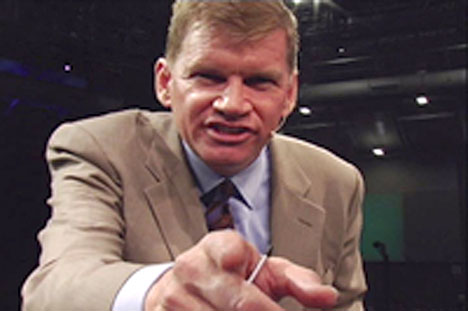“Without Vision The People Perish”
 Jesus took the blind man by the hand and led him outside the village. When he had spit on the man’s eyes and put his hands on him, Jesus asked, “Do you see anything?” He looked up and said, “I see people; they look like trees walking around.” Once more Jesus put his hands on the man’s eyes. Then his eyes were opened, his sight was restored, and he saw everything clearly. (Mark 8:22-25)
Jesus took the blind man by the hand and led him outside the village. When he had spit on the man’s eyes and put his hands on him, Jesus asked, “Do you see anything?” He looked up and said, “I see people; they look like trees walking around.” Once more Jesus put his hands on the man’s eyes. Then his eyes were opened, his sight was restored, and he saw everything clearly. (Mark 8:22-25)
 I can remember singing in the ‘70’s, “I Can See Clearly Now The Rain Is Gone.” I would replace “trees” for rain when reading the above scripture. Clarity of vision is so important. As believers in Jesus Christ we need the touch of Jesus to bring us clarity in every situation.
I can remember singing in the ‘70’s, “I Can See Clearly Now The Rain Is Gone.” I would replace “trees” for rain when reading the above scripture. Clarity of vision is so important. As believers in Jesus Christ we need the touch of Jesus to bring us clarity in every situation.
Can you imagine a believer who cries out, “Lord, give me the heart of an evangelist.” The Lord touches him, and he begins to see people, non-churched people all around him, but his heart isn’t there yet. He confesses, “Lord, I only see people as people; touch my eyes.” His prayer is answered when he sees not just people, but people who are lost, who need Jesus, who need to hear the gospel. He is a changed man with a changed vision. His reluctance now becomes his passion, for his vision is now cleared.
Can you imagine a believer who sits in the pew every Sunday, smiling shaking hands, giving informal greetings but feeling cold, alone, and almost displaced and prays, “Lord, touch my eyes to see who these people really are around me.” At first he looks and sees “church people”, people who look as if they got it all together, but then the Lord touches his eyes a second time! He is shocked seeing people who do not have it all together, but are hurting people, sick people, confused people, lonely people, a needy people. Jesus then touches the heart, and with the proper vision this believer begins to minister to those needs out of compassion which becomes his passion.
Or how about the frustrated teacher who “knows” his material, but it seems no one is interested in what he is teaching or understands the “material”. Then the Lord touches his eyes. He begins to see those whom he teaches beyond the view of just his material, but he sees them only as “students”. Only after a second touch, his vision clears; he realized who he teaches is more important that what he teaches. He begins to look into the heart, the spirit, and the daily lives of what he use to think as his “students” but discovers they have become his personal friend, and pour scriptural truth through practical applications into their lives. Teaching through walking out his lessons with them in their daily lives becomes his passion.
Or the believer who has learned the truth of intimate worship, that experience of being in the presence of God, through the shed blood of Jesus, led by the Holy Spirit. During one of those intimate experiences God not only touches their spirit, but also their spiritual eyes. They discover that God is in the midst of His people, but they are just other “believers” joining in this worship ritual. Only after a retouch by Jesus do they discover the mystery of unity of Spirit as those around worship together with this believer in Spirit and in Truth, taking corporate worship to a totally new level. The prophetic passion has now burns in these believers’ lives.
Finally, the person who has walked the evangelistic route being ridiculed by the lost, had his pastoral heart crushed by hurt relationships, felt no one listened when he spoke and taught the Word, and has experienced an estranged, almost distant feeling when worshiping, even wondering if God was there. He knows that what he is now seeing and feeling is not the will of God, so he stops and cries out for a touch from the Savior’s hand for clarity of vision. When first touched, he sees the hand of God in his past experiences, but he wants a fresh touch for the now, for the future, and Jesus lays his hands back on his eyes. Now he sees others who are doing the work he use to, but his heart is changed. For the first time his eyes are open to see “The Big Picture”, the entire Body of Christ. Now he wants to reach out to other believers to encourage them, strengthen then, guide them, and lead them by walking by their sides, not being in front of them. The servant’s heart kicks in to selflessly giving and thinking of others in their spiritual developments. The passion of an apostle is born.
I know I have tried to do what I thought was serving the Lord, serving the Church, for most of my life, thinking I was doing the Lord’s Will until I asked Jesus to touch my eyes again, for all I saw was “non-church people” in my daily life at work and “church people” in the social circles of my life. Wow! The second touch was dramatic: I discovered the lost; I discovered those already in the Body of Christ who were serving. A passion has now arisen in me to encourage, develop, support, lead through relationships, guide through the leading of the Holy Spirit those believers, those “brothers” and “sisters” who are in my family, the Family of God, the Body of Christ. Jesus, through His Holy Spirit, has truly opened my eyes.
 Stop right now. Ask the Lord to touch your eyes, give you vision. He will do so. If the vision at first isn’t entirely clear, ask for that second touch, but I warn you, that second touch will be life changing for a passion will be released in you to further the kingdom of God, in not only recognizing but also developing the body of Jesus Christ, His Church. “Lord, touch our spiritual eyes. Give us clarity of vision; give us Your vision. Amen”
Stop right now. Ask the Lord to touch your eyes, give you vision. He will do so. If the vision at first isn’t entirely clear, ask for that second touch, but I warn you, that second touch will be life changing for a passion will be released in you to further the kingdom of God, in not only recognizing but also developing the body of Jesus Christ, His Church. “Lord, touch our spiritual eyes. Give us clarity of vision; give us Your vision. Amen”
 The evening news tonight shifted from unrest and protests against dictators in the Middle East to unrest and protests in Wisconsin and Washington over up coming budget battles that could cripple Federal and State governments. With all these budget cuts, particularly of public services, how will the 21st Century church respond?
The evening news tonight shifted from unrest and protests against dictators in the Middle East to unrest and protests in Wisconsin and Washington over up coming budget battles that could cripple Federal and State governments. With all these budget cuts, particularly of public services, how will the 21st Century church respond? I would not be surprised if the public begins to look to the Church to “sacrifice” their services to meet their needs and wants. Will the Church be asked to respond through more food banks, rescue missions, counseling services, community service projects, programs, etc.? Will people in a confused, restless society look to the Church for tranquility, peace, and safety as it has in past history?
I would not be surprised if the public begins to look to the Church to “sacrifice” their services to meet their needs and wants. Will the Church be asked to respond through more food banks, rescue missions, counseling services, community service projects, programs, etc.? Will people in a confused, restless society look to the Church for tranquility, peace, and safety as it has in past history? 





































